Windows Insider article published on Mar 29, 2021
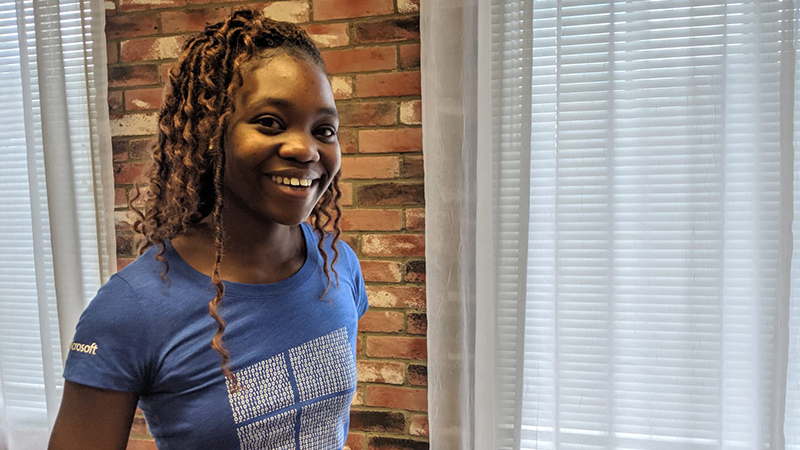
Pelagia Majoni is no stranger to hard work. After all, she’s the daughter of the one female mechanical engineer in Zimbabwe—innovating solutions is practically in her blood.
Growing up in Harare, Zimbabwe, Pelagia often found herself drafting solutions to the electricity and food shortage challenges in her community.
As a farming family, having agriculture-focused publications around the house wasn’t uncommon. After reading an article in Potato Country about Henry Ford and his attempt to power the Ford car with potatoes, she was inspired to experiment with potato power herself. She spent the next 18 months testing before presenting her innovation at the Intel International Science and Engineering Fair (ISEF) in 2017—the same year her family’s life changed.
After her family moved into a slum in 2008, the pull toward engineering got even stronger: her family became food insecure. Pelagia and her siblings couldn’t study at night because of the surrounding neighborhood noise. These new challenges inspired her to engineer solutions not only for her family, but also for her community. “I knew I wanted to be the woman to contribute to the solving of these problems,” she said.
To address the growing electricity shortages in her community at Intel ISEF in 2017, Pelagia created a battery from a decayed electrolytic potato paste, and it could light up a bulb that gave Pelagia and her siblings light to study for 20 days. Her invention was so unique, she won the Intel ISEF grand category’s second award, and she became the first African woman to have an asteroid named after her by MIT and NASA to celebrate her achievements in science.
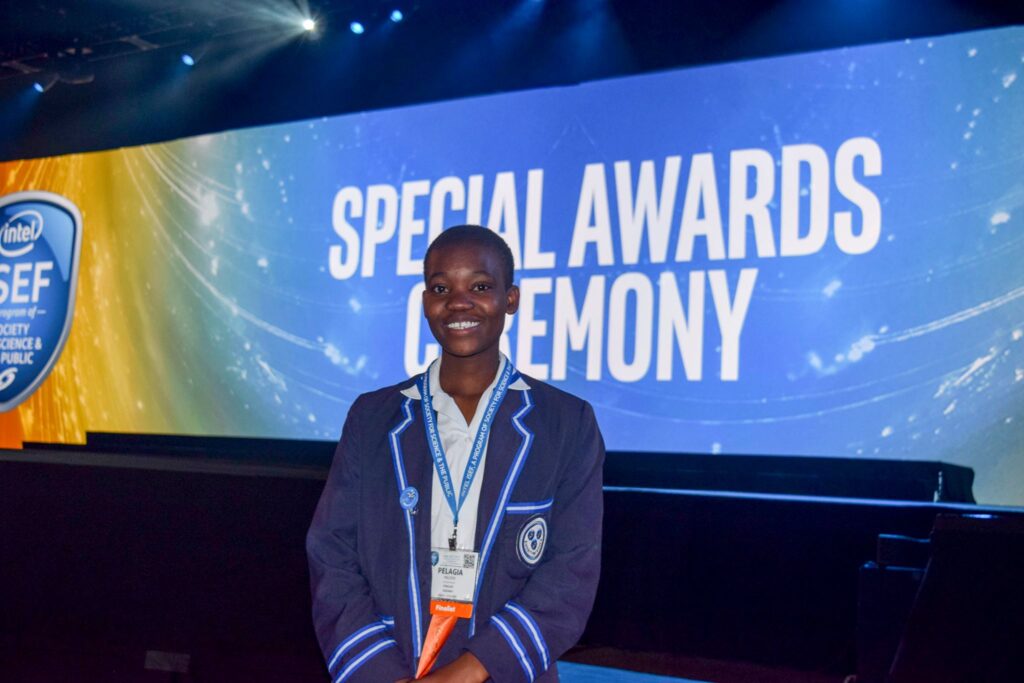
“Participation in Intel ISEF helped me discover my purpose in life. I aim to use technology to uplift marginalized communities like mine. At Intel ISEF, I visited other students’ booths, and I was amazed by the technologies young people like myself were building. I felt a deep urge to learn more about technology because the robotics and AI projects I learned about blew my mind,” she said.
“When I came back to the US on a full scholarship, I knew I was going to enter the field of technology. I really enjoy programming. I feel empowered. I know that I can now contribute in engineering technologies that uplift people from my community.”
Leading the way through STEM
Although it was daunting, participating in ISEF confirmed Pelagia’s talent for tech. When she left Zimbabwe to pursue computer science at Haverford College, she was eager to learn how to solve the challenges her community faced. She took her first introductory computer science class, and before she knew it, she was scripting programs to analyze soil characteristics to provide farmers with real-time information to boost their crop yields.
Pelagia hit the ground running as she delved deeper into higher education. Later in her undergraduate career, she interned at the University of Chicago’s Data Science for Social Good Center as the only female undergraduate—the rest of her team was made up of five male graduate students.
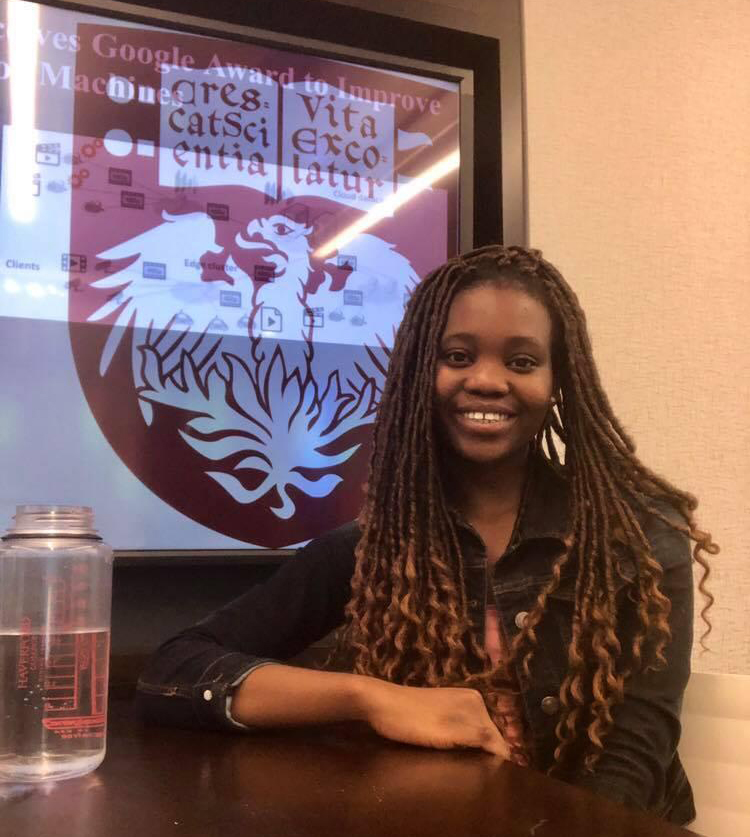
Now in her third year at Haverford College, Pelagia has already taken the initiative to teach and mentor young girls who share her interest in technology and community solutions. After her internship at University of Chicago ended last year, she did her usual for school breaks and traveled back to Zimbabwe during winter break to teach an introductory programming class in Python to 15 students. The class incorporated chicken rearing into it to show how to reduce hunger in their community, specifically focusing on engineering early disease detection sensors for chickens to reduce losses in harvest and production seasons.
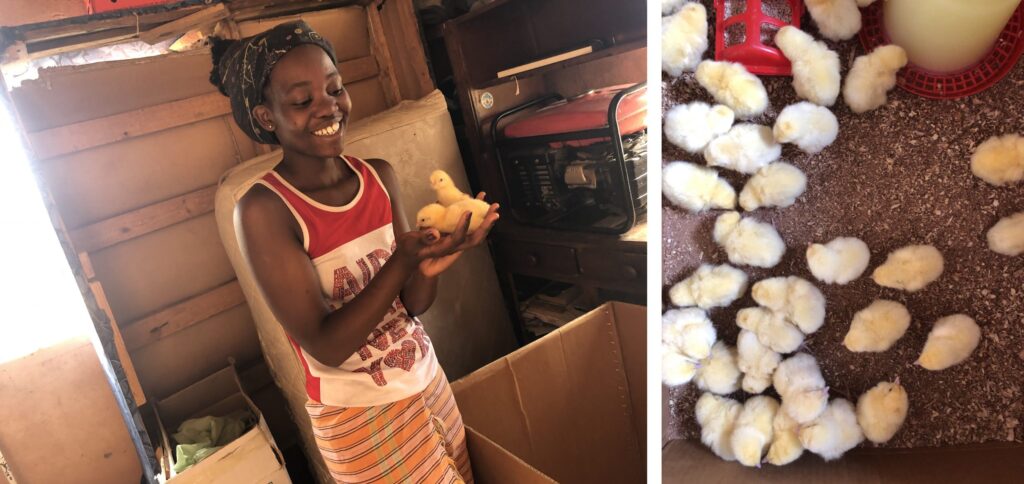
“My students loved the class but struggled to self-learn Python when I left them to resume my college studies,” she said. “To solve this problem, I am building a web application that allows my students to access mentors, CS textbooks, and courses for free. I hope to make tech education more accessible to marginalized communities.”
During this year’s University of Pennsylvania’s FemmeHack, an all-female hackathon hosted every February, Pelagia led a team of four women to build the first version of the web app, resources page, and a Python script specifically for free programming books—and they won. Now, she’s continued to work on the app between her studies and other commitments, and she hopes to launch it this summer.
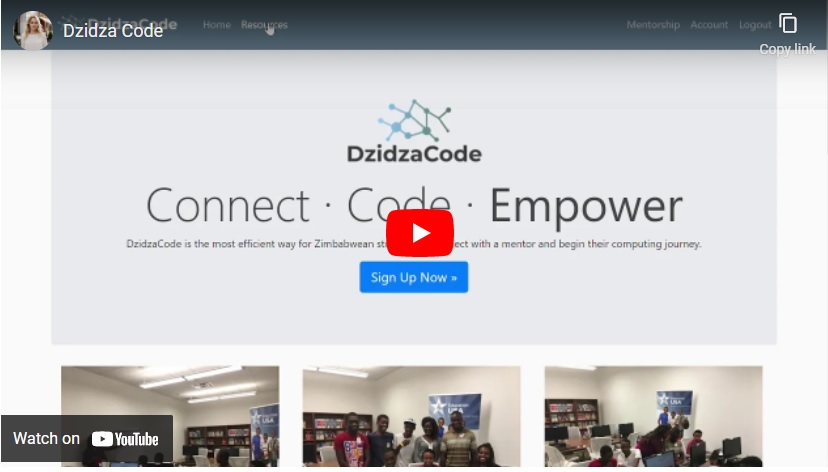
Through all the obstacles she’s faced as a woman in STEM, she doesn’t ever regret pursuing the field. Instead, she feels empowered to uplift and inspire the people she cares about. This led her to create IdyaCode (CodeToLive), an organization that introduces high schoolers to programming and its applications in agriculture to reduce starvation. Since participating in the first IdyaCode course, two of Pelagia’s students now aspire to study computer science and technology. In Zimbabwe, only 19% of female students graduate from STEM fields.
Seeing the impact of her work, Pelagia’s driven to dream bigger and work harder as she pursues her next goal—launching her agricultural center using the Abie Award prize money she received and her income as a software engineer once she graduates. Not only does she plan to fund the center herself, she also plans to make it sustainable for the Zimbabwe market.
Technological education has always been a guiding light in her journey. Even before founding IdyaCode, Pelagia knew how important continuing education opportunities were for her students back home in Zimbabwe. Last summer, she designed another educational web application called ATLAS that gives students resources and a roadmap to learning programming remotely—a real atlas for their personal journeys.
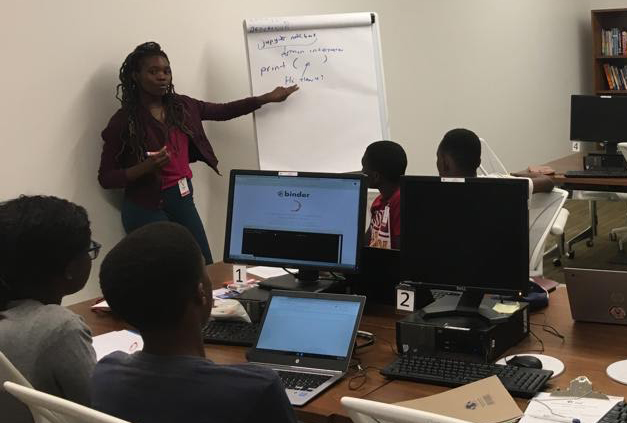
As she works to engineer this digital toolkit for her students, she also plans to upload the collection she has of textbooks, blogs, videos, and a relevant syllabus to ATLAS. From there, she hopes to create an actionable guide that outlines programming education how-to’s, skill creation, real world programming experience, and her own journey as a model for success.
Preparing for the future
60% of Zimbabwe’s population is food insecure due to the poor rains. Engineering irrigation and water harvesting technologies will reduce food shortage in Zimbabwe, Pelagia said, which has led her to create actionable guides and teach coding to young Zimbabweans, so they can prepare for future innovations. Almost all of her students live on less than $1.95 USD a day, so one of her long-term goals with the agricultural technology center will be to empower economically marginalized coders like her students with the resources they need to engineer technologies that reduce hunger in Zimbabwe.
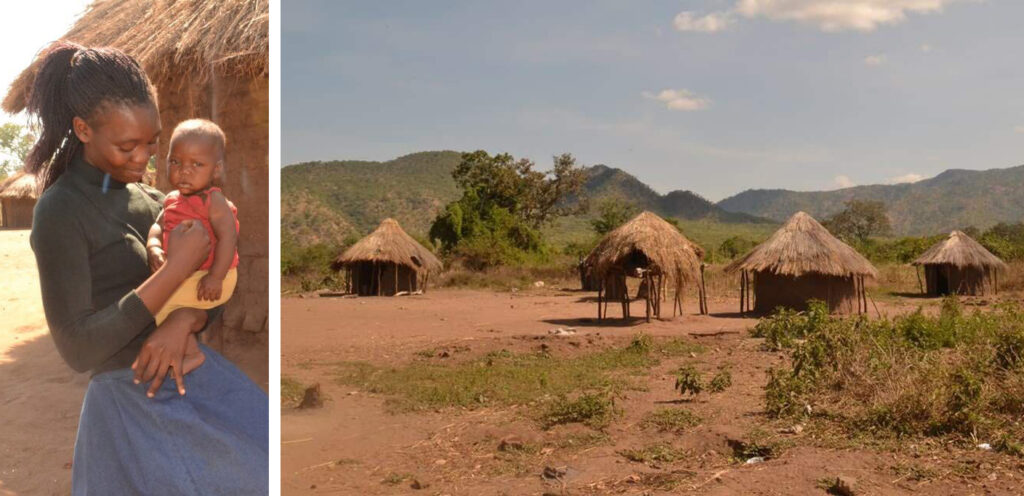
Growing up in southern Africa, when Pelagia heard the word technology, she immediately thought of Microsoft and Windows—the software was accessible to lower-income people like her and her family. She has fond memories of Windows, especially her first Python execution via Windows terminals and her first document on Microsoft Word. Since joining the Windows Insider Program in 2019, she’s been able to use Windows programs in her teachings, schoolwork, and innovations, and that year, she won the Grace Hopper Award and joined us at that year’s celebration.
“Windows empowers me to build technologies that impact me and my community back home in Zimbabwe. Before participating in the Windows Insider Program, I suffered from imposter syndrome. I felt like I wasn’t good enough. I did not feel confident in my abilities,” she said. “The program helped me believe in myself more. Participating in the Insider program made me feel less alone. I felt supported and uplifted by the community of women I connected with.”
Finding community at the Grace Hopper Celebration
Pelagia immersed herself in keynote sessions and activities at the 2019 Grace Hopper Celebration (GHC). (So much so that she stood out to the recruitment team at Warner Brothers and was offered an internship for the following summer in their Data Science department.) As she visited each session and networked with like-minded young women at the conference, Pelagia knew she wanted to use technology to help her community in Zimbabwe—she had known that since she was 14 years old.
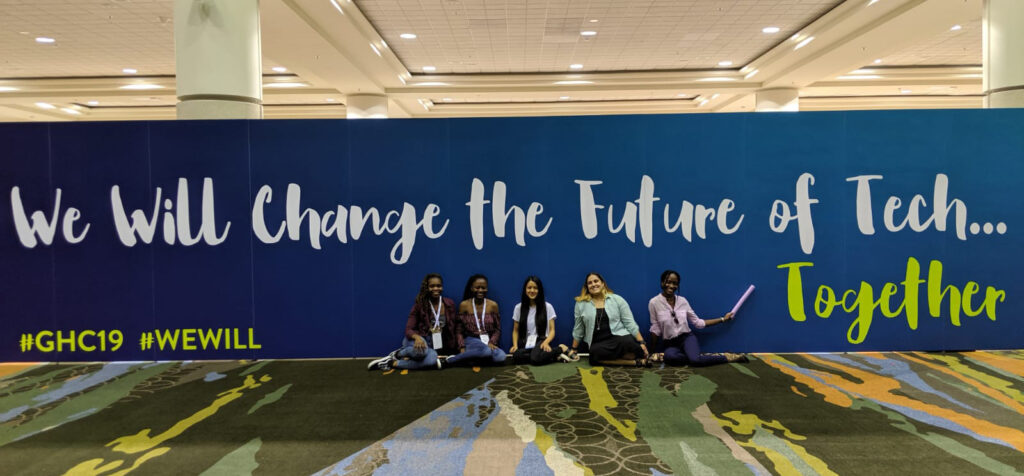
But it wasn’t until she heard her role model, Dr. Vivienne Ming, speak on the GHC mainstage about how having courage helped her create an AI system to reunite refugee children with their extended families that she realized she could seriously use her technical skills to reduce hunger in southern Africa.
“I talked to strangers on queues into the technical talks and was able to meet Rutha Nuguse, who became my mentor. My experience with her has made me realize that every woman needs a mentor. My experiences at GHC have inspired me to use technology to lead and mentor other women to thrive in a male-dominated tech industry,” she said. “Rutha really helped me find myself as a software engineer.”
From preparing for internship interviews to empowering Pelagia to take the next steps, Rutha helped Pelagia see her potential. “Having Rutha as my mentor has been phenomenal.”
Pelagia has received many accolades celebrating her work and women empowerment in the STEM field. Outside the GHC Award, she’s also one of just 10 Palantir Women in Technology Scholarship Awardees, as well as the winner of the Anita Borg Abie Student of Vision award, where she discussed her work using technology as a tool to help marginalized communities find hunger and poverty solutions.
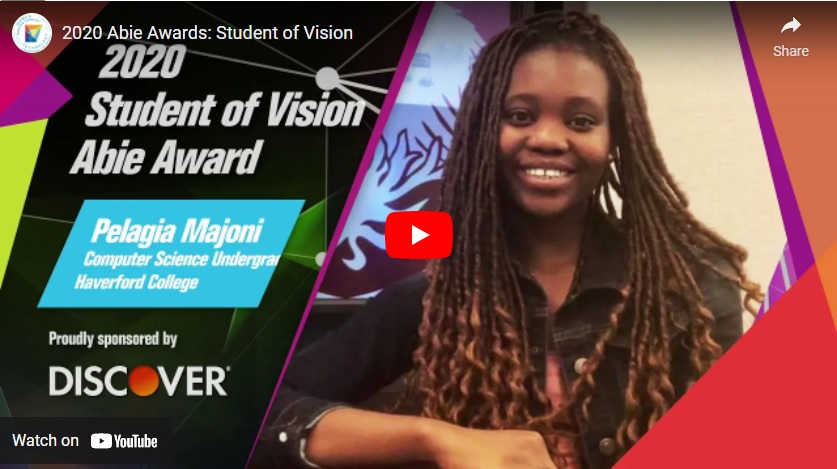
To gain more experience, she’s also participated in panels, summits, and internships that allow her to innovate and create among other like-minded students. So far in her young career, Pelagia has participated in the McKinsey and Company Diversity Midwest Diversity Summit, the Goldman Sachs Engineering essentials eight-week program, and the Citi Early ID eight-week technology program, gained experience as a Pinterest Engage scholar, and interned with Warner Brothers Media as part of the Data Science team, where she built a movie-identification search engine using Python and SQL. Not only that, she’s participated in three hackathons.
Most recently, she landed an internship with Microsoft’s software engineering department this summer, where she hopes to learn more about Microsoft, connect with fellow interns, and gain more experience and technical skills. With her track record as a Windows Insider and STEM achiever, that shouldn’t be an issue.
“Being an Insider is awesome because it allows me to get a glimpse of the future and provide feedback to the engineers who are building the products that allow me to make my life more creative and fulfilling,” she said.
“I hope young girls, when they look at me and my work, they see themselves and their stories reflected in me. I hope they will be inspired to pursue STEM, because they are beyond capable of changing the world through tech.”
With each award, engagement, class, and workshop under her belt, it’s safe to say Pelagia loves working in technology. As an aspiring software engineer who’s mentored women in the tech field and engaged with over 5,000 Zimbabwean students to inspire them to chase their dreams, she said she strongly believes that the people who build technologies should mirror the people for whom the innovations are created.
“I’d advise young girls and young women to know and believe that they can make a huge difference in their lives and those around them through STEM. They are truly capable. There are lines of code waiting to be written, bits begging to be manipulated, and socio-economic problems impatiently waiting to be solved by you,” she said.
“It is us women, who have the power to solve the problems we face in our daily lives. And through tech, I know we can do it.”
Original full design:

